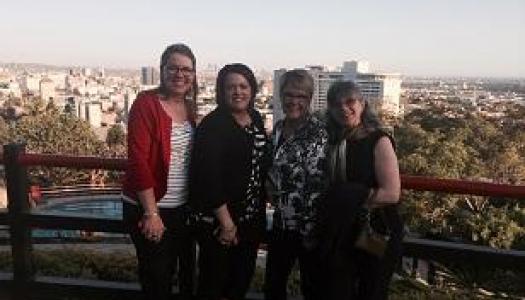ASCD 2014–Highlights, Frights, and Sound Bites
Join Our Community
Access this resource now. Get up to three resources every month for free.
Choose from thousands of articles, lessons, guides, videos, and printables.
Highlights
-
Spending three and a half days being learners together with Joan, Gail, and Allison at the ASCD conference was a definite highlight. Having time to excitedly share what we'd heard, what pushed our thinking, and what we'd taken to heart was a true gift. Usually coworkers and collaborators, we relished being colearners together.
-
Twitter has become a powerful source of professional development in my life. I have learned from and befriended amazing educators in my Twitter universe. Getting to meet two of them in person was a definite highlight. Though it was our first face-to-face encounter, it felt as comfortable as if we'd been hanging out for years.
Frights
-
Cab rides. Enough said.
-
Being woken up as a 4.4-magnitude earthquake shook my bed.
-
Sitting all day. The importance of giving our students brain and body breaks and chairs that fit their bodies was impressed upon me in full force.
Sounds Bites
Okay, they aren't really sound bites, but Highlights, Frights, and Quotes just didn't sound as good.
In a session titled "Reading as a 21st Century Skill: Understanding Text Complexity and the Practices That Produce Strong Readers," Jeanne Tribuzzi, a director of English Language Arts, ESL, and Second Language in New York, said this:
-
Our instruction must include increased practice time, stamina, and independence. (Wow. I almost stood up and did a little Daily 5 cheer right there.)
Other starred notes in my journal from her session include these:
-
What we do in school has to be drenched with meaning or kids won't learn it.
-
Common Core reading brings with it a shift from prereading to rereading.
-
Eighty-five percent of a student's independent reading should be books they can read with 99 percent accuracy at a rate of 90–100 percent comprehension. Fifteen percent can be spent with instructional-level text. She emphasized that zero independent time should be spent in challenging/frustration-level text.
Regie Routman is a highly respected educator, coach, and author. She inspired all her participants when she said that her beliefs are so solid, they keep her free from the compulsion to swing with educational reform. For 40 years, she has shifted with research, but she doesn't swing—she is too grounded for that. Here are some other Regie gems:
-
Teaching is a performance art that must be practiced on one's feet. It is hard work. But hard work can be joyful work.
-
All principals and teachers must be knowledgeable literacy leaders if sustainable change is going to happen.
-
Culture is key. We must create school cultures of high trust, collaboration, and enjoyment.
-
If we can engage their hearts and minds, we can teach kids anything they need to know.
-
If our expectations are low, we are holding kids back.
-
Failure is a normal and expected part of all success. Try, try again, and try some more.
Dr. Pamela A. Boure said this:
-
We must provide our students with unconditional positive regard.
-
Students will work harder and challenge us less if we value them as "human beings" rather than "human doings."
Dr. Donna Wilson emphasized these points:
-
Access where kids are and give them the education they need. They will not reach their academic potential if we don't.
-
If it is important, talk to children as though it is. Help them feel the importance.
-
Exercise promotes learning because it brings more oxygen and blood to the brain. We must provide opportunities for movement.
And with that reminder, I am aware that I have been sitting long enough. It's time for a brain and body break.







